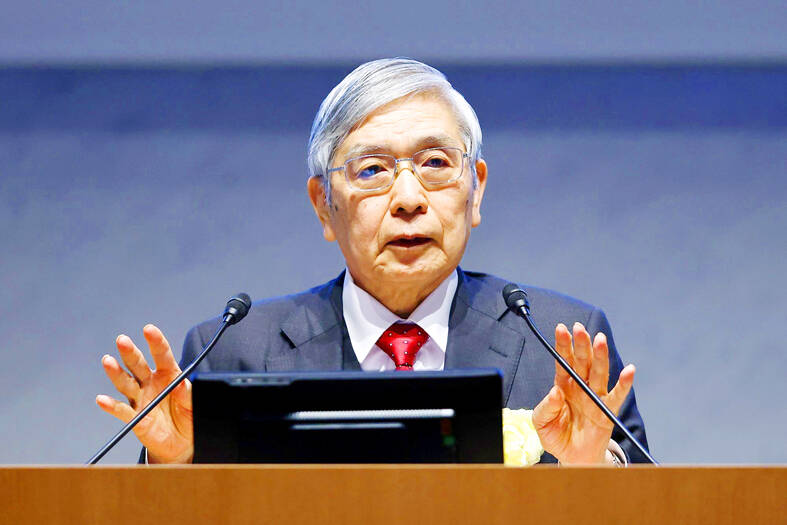Bank of Japan (BOJ) Governor Haruhiko Kuroda yesterday said that the bank’s latest tweaks on its bond yield control program were not the beginning of an exit of monetary easing, but a way to make it sustainable and run smoothly.
“This is definitely not a step toward an exit,” Kuroda said in a speech at an event hosted by business lobby Keidanren. “The bank will aim to achieve the price stability target in a sustainable and stable manner, accompanied by wage increases, by continuing with monetary easing under the framework of yield curve control.”
His comments came after the policy adjustments last week to double the upper limit of the 10-year bond yield shocked global financial markets and sparked speculation that the bank was taking a step toward normalizing policy.

Photo: Kiyoshi Ota, Bloomberg
The change, which blindsided all 47 economists surveyed by Bloomberg ahead of the decision, has the potential to upend global markets as the cap has helped keep borrowing costs low worldwide.
Later in the week, Japan’s key inflation gauge accelerated to the fastest pace since 1981, continuing to fuel speculation that the bank would surprise markets again.
Kuroda yesterday said that the move was aimed at improving market functions after the deterioration of the nation’s bond market was observed. The governor, whose term is set to end in April, said that the bank would maintain its “utmost support” by keeping accommodative financial conditions.
“Labor market conditions in Japan are projected to tighten further and firms’ price and wage-setting behavior is also likely to change,” Kuroda said. “We are approaching a critical juncture in breaking out of the prolonged period of low inflation and low growth since the collapse of the bubble economy.”

Stephen Garrett, a 27-year-old graduate student, always thought he would study in China, but first the country’s restrictive COVID-19 policies made it nearly impossible and now he has other concerns. The cost is one deterrent, but Garrett is more worried about restrictions on academic freedom and the personal risk of being stranded in China. He is not alone. Only about 700 American students are studying at Chinese universities, down from a peak of nearly 25,000 a decade ago, while there are nearly 300,000 Chinese students at US schools. Some young Americans are discouraged from investing their time in China by what they see

MAJOR DROP: CEO Tim Cook, who is visiting Hanoi, pledged the firm was committed to Vietnam after its smartphone shipments declined 9.6% annually in the first quarter Apple Inc yesterday said it would increase spending on suppliers in Vietnam, a key production hub, as CEO Tim Cook arrived in the country for a two-day visit. The iPhone maker announced the news in a statement on its Web site, but gave no details of how much it would spend or where the money would go. Cook is expected to meet programmers, content creators and students during his visit, online newspaper VnExpress reported. The visit comes as US President Joe Biden’s administration seeks to ramp up Vietnam’s role in the global tech supply chain to reduce the US’ dependence on China. Images on

Taiwan Transport and Storage Corp (TTS, 台灣通運倉儲) yesterday unveiled its first electric tractor unit — manufactured by Volvo Trucks — in a ceremony in Taipei, and said the unit would soon be used to transport cement produced by Taiwan Cement Corp (TCC, 台灣水泥). Both TTS and TCC belong to TCC International Holdings Ltd (台泥國際集團). With the electric tractor unit, the Taipei-based cement firm would become the first in Taiwan to use electric vehicles to transport construction materials. TTS chairman Koo Kung-yi (辜公怡), Volvo Trucks vice president of sales and marketing Johan Selven, TCC president Roman Cheng (程耀輝) and Taikoo Motors Group

New apartments in Taiwan’s major cities are getting smaller, while old apartments are increasingly occupied by older people, many of whom live alone, government data showed. The phenomenon has to do with sharpening unaffordable property prices and an aging population, property brokers said. Apartments with one bedroom that are two years old or older have gained a noticeable presence in the nation’s six special municipalities as well as Hsinchu county and city in the past five years, Evertrust Rehouse Co (永慶房產集團) found, citing data from the government’s real-price transaction platform. In Taipei, apartments with one bedroom accounted for 19 percent of deals last